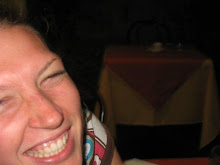I recently read Faces of Poverty, Faces of Christ by John Kavanaugh, a philosophy professor here at SLU. It was recommended to me as a good resource in preparation for a retreat I am leading where I am presenting a talk regarding service. But toward the end I discovered this chapter (I’ve omitted a few paragraphs for the sake of brevity and relevancy):
“A vocation is a calling-forth of a person, an unfolding of a human career that starts at the earliest moments of our existence. Vocation bears the concreteness of a developing body, the stuff of genes and womb, of time and place, of family and birth. We are called out into this world, and out calling is unavoidably local: this time, this place. Now.
“A vocation is a struggle. It is the labor of becoming, of working out a mission.
“That labor, that mission is love. Paul reminds us in First Corinthians that our adulthood and the fulfillment of all our diverse gifts finds itself in love. This is the highest gift behind all natural talents and specific tasks. If there is not love, there is nothing.
“Love, then, is the core. Created by love, started by love, nurtured by love, we are only real and lasting because of love.
“Thus, a vocation is not something that merely makes us feel good, nor is it necessarily easy. Neither is life or love. For in both life and in love, vocation becomes real only through struggle, purification, and pain.
…
“Vocations are questioned at moments of vulnerable crisis. But crisis, that wound of choice, that terrible mark of freedom, is often the very moment of deepening life and love in us.
“That is not to say that it is impossible for a profound life choice to be shifted under the guidance of the Holy Spirit. But I think it is most rare. The long labor of love in crisis is not the dying of a vocation. It may only be the final birth of it.
“Those who are basically happy in their vocations have discovered this truth.
…
“The only ‘highest’ vocation is love itself, resounding through all our different voices.
…
“We live out, by the relinquishments of our lives, a wider range of God’s love than could be imagined without us. So it is with all vocations.
“The happiest people, whether single, married, parents, priest, sister, or brother, are happy not only because they have found themselves. They are happy because they have made a singular and irreplaceable divestment.
“Having found themselves, they give themselves away.
“They have been called.”
(Kavanaugh, John F. Faces of Poverty, Faces of Christ. Maryknoll, NY: Orbis Books, 1991. Print.)
So much of this speaks to my attitude about my calling. Even though I spent a while running away from what I now realize is my vocation, it is obvious that God spent years laying out this path for me. There are many events that I now see as pivotal to my recent decisions, which at the time I shrugged off or interpreted in different ways.
I know that what I am doing will not be easy, nor has it been easy so far, yet when I look toward my future I am so much more hopeful and so much more happy than I had been before. I look forward to what I will be doing and I know that this is where God wants me to be.
I love how Kavanaugh talks about the “relinquishments of our lives” because this speaks so much to the transformation that occurred in my attitude and my outlook this summer. I had been clinging to this idea of being a teacher, refusing to give it up because I had just put too much work into it to turn around. But when I finally let go of my own will and placed God’s will above all else, I realized how much more fruitful and fulfilling my life would be in His hands
I don’t think I would have called being a teacher my vocation. I definitely consider my life as a youth minister my vocation.
Today I turn around
Stop running away from Him.
Today I listen
And run toward.
Subscribe to:
Post Comments (Atom)

No comments:
Post a Comment